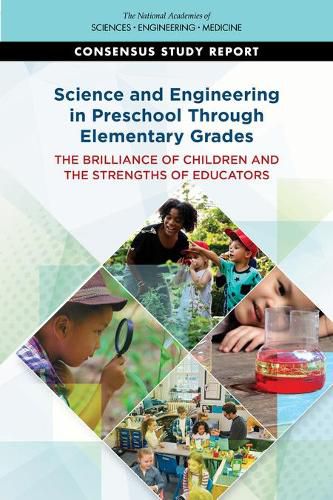Readings Newsletter
Become a Readings Member to make your shopping experience even easier.
Sign in or sign up for free!
You’re not far away from qualifying for FREE standard shipping within Australia
You’ve qualified for FREE standard shipping within Australia
The cart is loading…






Starting in early childhood, children are capable of learning sophisticated science and engineering concepts and engage in disciplinary practices. They are deeply curious about the world around them and eager to investigate the many questions they have about their environment. Educators can develop learning environments that support the development and demonstration of proficiencies in science and engineering, including making connections across the contexts of learning, which can help children see their ideas, interests, and practices as meaningful not just for school, but also in their lives. Unfortunately, in many preschool and elementary schools science gets relatively little attention compared to English language arts and mathematics. In addition, many early childhood and elementary teachers do not have extensive grounding in science and engineering content.
Science and Engineering in Preschool through Elementary Grades provides evidence-based guidance on effective approaches to preschool through elementary science and engineering instruction that supports the success of all students. This report evaluates the state of the evidence on learning experiences prior to school; promising instructional approaches and what is needed for implementation to include teacher professional development, curriculum, and instructional materials; and the policies and practices at all levels that constrain or facilitate efforts to enhance preschool through elementary science and engineering.
Building a solid foundation in science and engineering in the elementary grades sets the stage for later success, both by sustaining and enhancing students’ natural enthusiasm for science and engineering and by establishing the knowledge and skills they need to approach the more challenging topics introduced in later grades. Through evidence-based guidance on effective approaches to preschool through elementary science and engineering instruction, this report will help teachers to support the success of all students.
$9.00 standard shipping within Australia
FREE standard shipping within Australia for orders over $100.00
Express & International shipping calculated at checkout
Starting in early childhood, children are capable of learning sophisticated science and engineering concepts and engage in disciplinary practices. They are deeply curious about the world around them and eager to investigate the many questions they have about their environment. Educators can develop learning environments that support the development and demonstration of proficiencies in science and engineering, including making connections across the contexts of learning, which can help children see their ideas, interests, and practices as meaningful not just for school, but also in their lives. Unfortunately, in many preschool and elementary schools science gets relatively little attention compared to English language arts and mathematics. In addition, many early childhood and elementary teachers do not have extensive grounding in science and engineering content.
Science and Engineering in Preschool through Elementary Grades provides evidence-based guidance on effective approaches to preschool through elementary science and engineering instruction that supports the success of all students. This report evaluates the state of the evidence on learning experiences prior to school; promising instructional approaches and what is needed for implementation to include teacher professional development, curriculum, and instructional materials; and the policies and practices at all levels that constrain or facilitate efforts to enhance preschool through elementary science and engineering.
Building a solid foundation in science and engineering in the elementary grades sets the stage for later success, both by sustaining and enhancing students’ natural enthusiasm for science and engineering and by establishing the knowledge and skills they need to approach the more challenging topics introduced in later grades. Through evidence-based guidance on effective approaches to preschool through elementary science and engineering instruction, this report will help teachers to support the success of all students.